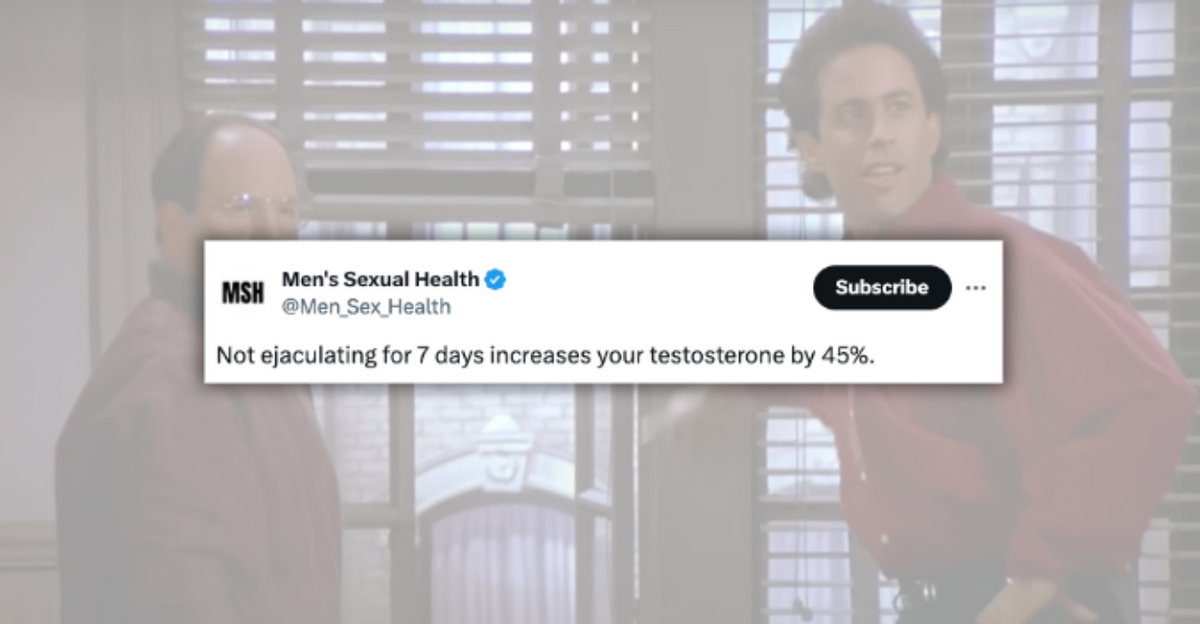On March 26, 2024, the X (formerly Twitter) account Men's Sexual Health posted a claim regarding ejaculation — that by not doing so for seven days, a man's testosterone levels increase by 45%:

This claim has been around for a while. Men's Health UK proffered pretty much the same claim on X in 2018:

The specific claim of a 45% increase in testosterone after seven days of ejaculation abstinence comes from a retracted study published in 2003. While it was not retracted for methodological problems (we'll come back to this later), the study was extremely limited, and its findings have not been replicated.
From a pool of only 28 participants, the authors of that study "found that the fluctuations of testosterone levels from the 2nd to 5th day of abstinence were minimal" but that "on the 7th day of abstinence … a clear peak of serum testosterone appeared, reaching 145.7% of the baseline."
That seventh day peak, the authors found, occurred only once — even when participants abstained for an additional seven days — and levels quickly returned to baseline. The findings of this report are shown in the graphs below:

Semen retention, as the practice is referred to in academic circles, is one of the most common categories of male health misinformation online, according to a 2022 study in the International Journal of Impotence Research.
Internet personalities, especially those promoting testosterone treatments and anti-masturbation or anti-pornography causes, have taken the finding of this small and dated study — derived essentially from a slightly more controlled version of "The Contest" from the NBC sitcom "Seinfeld" — and made sweeping and incorrect conclusions from them.
For example, X influencer Oliver Anwar, who describes himself as "Elite Health Coach To CEOs & Entrepreneurs," argued that these results meant that "the optimal ejaculation frequency for men testosterone-wise is 7 days" and therefore "having sex 1x per week is the best way of elevating T production."
Another X account extrapolated the results of this same study further, while also misrepresenting its statistics. "7 days off porn, and testosterone increases by 145.7%," The Testosterone Consultant posted on X in March 2022, confusing the phrase "145.7% of baseline" levels testosterone levels with a 145.7% increase in testosterone levels.
The study did not once mention pornography, and it did not suggest abstinence resulted in lasting increases in testosterone. In fact, the study did not find any long-term increase in testosterone levels as a result of abstinence from ejaculation, except for that one brief and temporary peak on the seventh day. Taking these results on their own, abstinence would not be an effective way to elevate testosterone production in any lasting sense.
Crucially, however, there is no great reason to take these over 20-year-old results on their own. For one thing, the study has been retracted — not due to methodological problems, but because the authors had already published the same exact work in a Chinese-language journal. For another, their findings haven't exactly been replicated, as described in a March 2021 article for The Conversation:
A 45% increase in testosterone levels after seven days of abstinence … was a temporary peak which then returned to the same levels as before, even with continued abstinence, and stayed that way. Such transient alterations in testosterone levels are unlikely to have any lasting effects on men's health and may primarily serve as a regulator of the creation of new sperm.
A few studies, on the other hand, have shown either no effect of abstinence on testosterone or that testosterone levels were actually higher after masturbation or sex. Measuring testosterone before and directly after masturbation in 34 healthy young men found that testosterone levels increased after self stimulation. But any longer term effects were not checked.
At best, the evidence linking masturbation with changes in testosterone levels is limited and with mixed conclusions.
Because the claim of a 45% increase comes from an old and retracted study, because that study never suggested a permanent or lasting increase in testosterone as a result of abstaining from ejaculation, and because the study's results have not been replicated, Snopes rates the claim "False."

